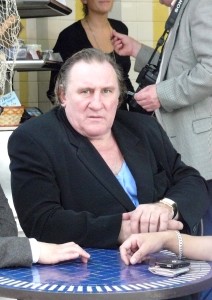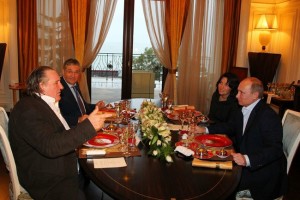When you move abroad to live or study in another country, you’ll “suffer” from culture shock.
Culture shock is the effect triggered by the prolonged encounter with another culture.*
Click to tweet
I hear you saying: “Ah, Ah! So what?”
I know, this definition is quite …cold and academic.
But the reality is: understanding what culture shock is and how it can affect you will help you.
It won’t prevent you from feeling sad, angry and disconnected at times. No.
But you’ll be able to recognize when it strikes.
You’ll feel confident that YOU are NOT the problem…
Culture shock is a well-known phenomenon. Culture shock affects all expats. Welcome to the club.
To illustrate how culture shock works, let me tell you a little story.
Last month, Gérard Depardieu, a well-known French actor, became the most famous expatriate in the world.
He made the headlines of an international press campaign, unleashing the wrath of some, provoking the resentment of others, eventually winning the support of a tiny minority.
In short, he did not leave anyone indifferent.
What happened? For those who missed the facts, here is a quick summary.
In early december 2012, Gérard Depardieu decided to leave France with great fanfare. He was very upset by a proposed French legislation: each person earning above 1 million EUR a year should pay to the French treasury 75% of her income. Depardieu outlined that he already paid around € 150 million to the French state. He had enough and looked to buy a house in Belgium.
The French Premier got very upset to see this French symbol leaving and called him “pathetic”. That was the straw that broke the camel’s back.
Depardieu went a step further: he announced that he would give up French citizenship!
A few days full of tension ensued. Analysts mentioned that while Depardieu’s statement had a great symbolic impact, in reality, it was impossible. He could not become “stateless”.
This is when Vladimir Putin came on the scene: he signed a special decree granting Gérard the Russian nationality on January 3rd. This procedure is extremely rare. And for 2 reasons: few foreigners ask for a Russian passport (usually it’s the opposite!) and when this does happen, it takes a couple of years to get an answer.
For Gérard, everything went quickly. His Russian passport in the pocket, he got a personal invitation from Putin, he was welcomed with great honors in Moscow and was offered villas and apartments, even a position at the Ministry of Culture!
In full euphoria, he declared: “I adore your country, Russia, your people, your history, your writers … your culture and your way of thinking,” he said. “Russia is a country of great democracy.”
Public opinion which at first showed some sympathy for Depardieu’s conduct could not follow anymore: surprise, incredulity, anger.
But what if in reality Gérard Depardieu was suffering from the first stage of culture shock?
Let’s have a closer look at the still very popular model established in the 60’s by Oberg.
It is characterized by 4 phases:
1/ Honeymoon
This is obviously the first stage in which Gérard finds himself. He’s very excited to discover his new country. Everything is beautiful, fantastic, great. He’s welcomed like a hero, treated like a prince. His host country is fabulous, everything goes so smoothly.
He looks at life through rose-tinted glasses.
Excited by the move, he can only see the positive aspects of his new country.
In this stage, novelty and curiosity contribute to the sense of excitement, enchantment and euphoria experienced in the first couple of weeks. This is love at first sight.
2/ Crisis
When the dust settles however, in a few weeks or a couple of months, (how long will depend on each individual) Depardieu will have to confront reality.
He’ll get upset with the huge traffic jams in Moscow. Getting to the airport takes hours. Of course, he can take a private jet or a helicopter, but the bills add up.
All those things cost a fortune. Moscow is one of the 10 most expensive cities in the world.
To get a crusty baguette, some golden croissants, a decent plate of French cheese, Gérard will have to pay up to 10 times what he used to spend in France. Luckily the tax rate is only 13% in Russia!
But to benefit from this low tax rate, he’ll have to live at least 6 months per year in the country. How is the climate in Moscow? Suffocating summer heatwaves and 5 winter months at -10°C on average (lowest on record was -42°C) with snow. Even if Gérard writes a letter of complaint to Putin, I doubt he’ll get any help on that side.
And there is the language barrier: you can’t even read the signs when going around. This is really so frustrating. Finding the appropriate toilet can be daunting. Specially for Gérard with his sensitive bladder.
As you can see, this stage marks the time when you feel different. You notice all that’s going wrong by comparison to home: how easier it was (in your home country) to secure an internet connection, buy a car, rent a house. You feel frustrated and angry when people don’t even greet you when you enter a shop, don’t even grant you a smile or offer you an apology when they shove you!!
Because you’re judging according to your references, you start to figure out all kinds of explanations: “Don’t they like my face? Am I speaking so badly that the locals don’t even bother to answer? Why are they so moody? Oh my God, I’m never going to make it here!”
This is the “hate” phase.
3/ Recovery
A “love and hate” relationship does not leave many options open: either you leave or you adapt.
At this stage, you’ve learned some basics of the culture and you start to think things over.
Depardieu will know that if people don’t greet him when he enters a shop, it’s not because they don’t like him (on the contrary, Russians love him) but simply because they’re not used to greeting people other than friends! He’ll be familiar with the signs for the toilets and able to start a basic conversation in Russian.
Life will become smoother.
4/ Adjustment
The last stage is belonging. We can expect Depardieu to speak Russian fluently. He’ll be giving toasts with vodka in the early morning, holidaying with Russian friends in his dacha on the countryside. In short, he’ll be fully aware of the local customs and well integrated in the community.
Is it also your case right now? What about your children? Did they go through the same stages?
Maybe, maybe not. How appealing the Oberg’s model is, it’s not universal. But this is another story that I’ll unveil in the next blog post. You don’t want to miss it, right? You can subscribe here.
By the way, how should we explain Depardieu’s conduct:
culture shock, praise of a regime for personal interests or stunt?
Hard to say. He is such a good actor!
* Definition inspired by the book “The psychology of culture shock” by Colleen A. Ward, Stephen Bochner, Adrian Furnham.
** A big thank you to Jean-Luc Chevrier from “Les Langues de l’export” for his help on the Russian culture.

